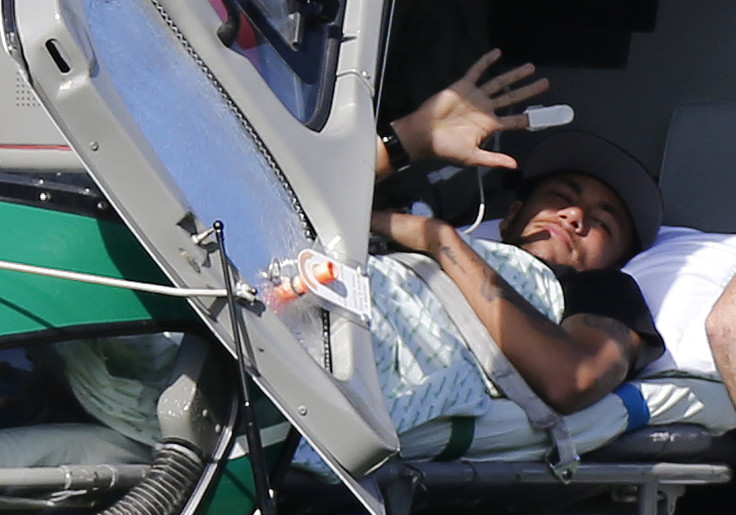Brazil World Cup: Neymar Injury, Thiago Silva Out; Probable Lineups, Tactical Analysis For 2014 Semifinal Against Germany

Brazil will head into the biggest home match in 64 years without both the team’s talisman and its captain on the pitch. If Brazil are to lift this World Cup and go some way to erasing the disappointment of 1950, then head coach Luiz Felipe Scolari and his squad will certainly have to do it the hard way.
The unthinkable happened against Colombia in the quarterfinals, when the player upon whom there has been so much pressure to inspire a nation to triumph suffered an injury that means he will miss the rest of the tournament. Such has been the devastation felt by the loss of the Barcelona forward that there has since been denied reports that consideration was being made to pumping him full of painkillers to somehow play through a broken vertebrae. His coach called Neymar’s injury a “catastrophe.”
"Neymar was our benchmark, one of our references because he is a player who makes a difference in any team,” Scolari said. “We're in a situation where we've lost something we don't want to miss.”
But he is not the only loss. For their semifinal against Germany on Tuesday, Brazil will also be missing their influential captain and defensive lynchpin Thiago Silva, whose suspension for a second yellow card in the tournament has been upheld by FIFA. For a side that has stumbled rather than sauntered through to the last four of its home World Cup and now faces its toughest test yet, it is a massive test of their ability and character.
Scolari attempted the impossible task of moving past the injury to Neymar on Sunday when Willian and Bernard, the two players most likely to replace the fallen star, were presented for a press conference. Each provides different options for Scolari. Bernard, a talented 21-year-old, has been a favorite of Scolari’s since his positive impacts off the substitute’s bench during last year’s Confederations Cup. He was picked for the World Cup despite limited action since moving to Europe with Shakhtar Donetsk last summer. In terms of the player most able to replicate Neymar’s impish skill, then Bernard arguably fits the bill.
However, it is unlikely to be the option Scolari chooses. This is a Brazil team based upon counter-attacking and will surely be even more pragmatic without Neymar. Willian will provide significantly more without the ball than Bernard. The 25-year-old, who was coincidentally replaced by Bernard in Donetsk, showed in his first season with English Premier League outfit Chelsea that he is extremely adept at playing in a counter-attacking system. Indeed, he became a favorite of coach Jose Mourinho largely because of the dedication he showed to his work without the ball. He still has pace and skill to pose a threat in possession, although his end product pales in comparison to Neymar, having scored just four goals in 45 matches with Chelsea last campaign.
There also remains the possibility that Scolari will be even more cautious and instead utilize Willian’s club-mate Ramires. Like so many of this current Brazil squad, Ramires is extremely athletic, though lacks a great deal of quality when in possession. He managed one start in this World Cup, against Mexico, but having disappointed and come off at half-time, Scolari may have doubts about handing him a second. Central midfielder Hernanes is another outsider in the list of contenders.
It could well be that whoever Scolari chooses to take Neymar’s place it will lead to a shift in Brazil’s midfield that should actually be beneficial defensively. The one real change Scolari has made in this World Cup from the victorious Confederations Cup of last summer was to give Neymar the freedom of the No. 10 role and move Oscar out wide.
When Oscar occupied the most advanced midfield role, he provided far more of an all-round presence. Able to get on the ball and create, the Chelsea man was also a willing and able worker when the opposition was in possession. With Neymar instead floating around off striker Fred, Brazil’s midfield has been left to just two men, causing problems in almost every game it has played. Luiz Gustavo has been overworked, particularly with Paulinho off form.
Had that midfield gone up against Germany’s, which improved significantly in their quarterfinal win over France, then it would have left Brazil at a real disadvantage. Instead, a trio of Luiz Gustavo, Fernandinho and Oscar should be able to matchup much better against Bastian Schweinsteiger, Sami Khedira and Toni Kroos.
The need for the midfield to be more robust is reinforced by having a defense behind them that will be missing the presence of Thiago Silva. While both full-backs and David Luiz can be somewhat unpredictable and often found charging upfield to aid attacks, Silva, the world’s best defender, has been a rock at the heart of the back four. Dante, a Champions League winner with Bayern Munich just over a year ago, is far from a shabby replacement, but he can be prone to the odd rash decision. Luiz, who will take the captain’s armband, will now have to become, not just a charismatic leader, but a responsible one.
Forced to make two changes, it is unlikely that Scolari will make any more. Maicon did enough against Colombia to justify continued selection over Dani Alves, while it would be a massive call now for Scolari to dispense with Fred and turn to Jo up front.
Ultimately, Brazil were always unlikely to technically outplay Germany in a free-flowing match. Without their most talented player, that now is an even slimmer possibility. But, with arguably a now more balanced team, hope remains that Brazil can continue to do the only thing that truly matters to its demanding population: win.
Probable Lineup
G: Julio Cesar
D: Maicon, David Luiz, Dante, Marcelo
M: Fernandinho, Luiz Gustavo
Willian, Oscar, Hulk
F: Fred
© Copyright IBTimes 2025. All rights reserved.





















